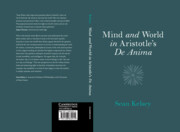2 - Problems
from Part I - Questions
Published online by Cambridge University Press: 16 December 2021
Summary
In this chapter I develop the point that the knowledge Aristotle particularly wants to explain is knowledge of beings. I work from certain problems he thinks prevented his predecessors from defining psuchē satisfactorily. I focus on two issues in particular: whether knowledge is “like by like” and “alteration.” I argue that the problem raised by both issues is at bottom the same. If knowledge is alteration, and is “like by like,” the result is that our knowledge is so colored by arbitrary facts about us as to belie the idea that it is really of beings as they are “in themselves.” If knowledge is not “like by like,” and leaves its subjects unaltered, the result is to make it unintelligible in principle why subjects of knowledge have anything to do with its putative objects. In short, the problem is how to respect the fact that knowledge is of beings, as they are in their own right, without rendering that fact an inscrutable mystery. For these points I rely on De Anima I 2, III 3, and Metaphysics G 5. These texts combine to establish that, for Aristotle, the outstanding representative of the problems in this area is Protagoras.
Information
- Type
- Chapter
- Information
- Mind and World in Aristotle's De Anima , pp. 39 - 49Publisher: Cambridge University PressPrint publication year: 2021
